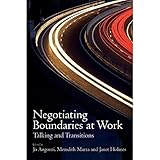Negotiating Boundaries at Work : Talking and Transitions / Janet Holmes, Jo Angouri, Meredith Marra.
Material type: TextPublisher: Edinburgh : Edinburgh University Press, [2022]Copyright date: ©2017Description: 1 online resource (256 p.)Content type:
TextPublisher: Edinburgh : Edinburgh University Press, [2022]Copyright date: ©2017Description: 1 online resource (256 p.)Content type: - 9781474403139
- 9781474403146
- 658.4/5 23
- HD30.3 .N379 2017
- HD30.3 .N379 2017
- online - DeGruyter
| Item type | Current library | Call number | URL | Status | Notes | Barcode | |
|---|---|---|---|---|---|---|---|
 eBook
eBook
|
Biblioteca "Angelicum" Pont. Univ. S.Tommaso d'Aquino Nuvola online | online - DeGruyter (Browse shelf(Opens below)) | Online access | Not for loan (Accesso limitato) | Accesso per gli utenti autorizzati / Access for authorized users | (dgr)9781474403146 |
Frontmatter -- Contents -- Notes on Contributors -- Introduction: Negotiating Boundaries at Work -- Part I Transitions to a Profession -- 1 Language Mentoring and Employment Ideologies: Internationally Educated Professionals in Search of Work -- 2 ‘Oh It’s a DANISH Boyfriend You’ve Got’: Co-membership and Cultural Fluency in Job Interviews with Minority Background Applicants in Denmark -- 3 Constructing a ‘Mission Statement’: A Multimodal Perspective on Believable Identity Construction in a Job Interview -- 4 Teamwork and the ‘Global Graduate’: Negotiating Core Skills and Competencies with Employers in Recruitment Interviews -- 5 ‘Doing Evaluation’ in the Modern Workplace: Negotiating the Identity of ‘Model Employee’ in Performance Appraisal Interviews -- 6 Negotiating Social Legitimacy in and across Contexts: Apprenticeship in a ‘Dual’ Training System -- Part II Transitions within a Profession -- 7 Multilingualism and Work Experience in Germany: On the Pragmatic Notion of ‘Patiency’ -- 8 The ‘Internationalised’ Academic: Negotiating Boundaries between the Local, the Regional and the ‘International’ at the University -- 9 ‘Have You Still Not Learnt Luxembourgish?’: Negotiating Language Boundaries in a Distribution Company in Luxembourg -- 10 Working and Learning in a New Niche: Ecological Interpretations of Work-Related Migration -- 11 Collaborating beyond Disciplinary Boundaries -- Index
restricted access online access with authorization star
http://purl.org/coar/access_right/c_16ec
Focuses on transition talk and boundary crossing discourse in the modern workplace Moving between linguistic, professional and national boundaries is part of the daily reality of modern workplaces, where the concept of a 'job for life' is now outdated. Employees move between jobs, countries and even professions during their working lives, but the multilayered process of redefining personal, social and professional identities is not reflected in current workplace research. This volume brings together a range of scholars from different disciplinary areas in the field, examining the challenges of transition into a (new) workplace, team or community, as well as transitions within different professional communities. By analyzing the strategies individuals adopt to navigate the boundaries they face (in languages, workplaces or countries), this book demonstrates that transitions are not linear but are negotiated and constructed in the situated ‘here and now’ of workplace interaction, at the same time as they are positioned in the wider socioeconomic order.Key FeaturesFocuses on the urban workplace environment and workforce mobility Contributors approach transitions from a number of perspectives representing the range of work currently being undertaken in the areaA range of cases are discussed in each chapter
Mode of access: Internet via World Wide Web.
In English.
Description based on online resource; title from PDF title page (publisher's Web site, viewed 29. Jun 2022)


